Eight years ago, Typhoon Yolanda (or Typhoon Haiyan), one of the strongest storms ever recorded, ravaged the provinces of Samar and Leyte. A Filipina expat in Barcelona relives the harrowing experience she and her family went through, almost costing her her two sons, a tale familiar to OFWs every time typhoons and calamities hit home.
“Nandito na! Dumating na!”
Nora, sitting nervously on her couch in Barcelona, listened to her sister scream on the other end of the line. It was already 3 a.m. in Guiuan, Samar. Her sister´s voice was drowned by the sounds of sudden and abrupt rushes of wind coupled with bucketing rain violently banging on their roof in the background. Her grip on her mobile phone tightened as she tried to imagine her hometown being battered by Typhoon Yolanda.
“Yung bubong nilipad na!!!”
Nora told her sister to hang up as her phone credit was running out.
“Bumagsak na yung balkon!!!”
Nora hurriedly dashed to the nearest computer shop to top up her phone. She only got to call back fifteen minutes later but the line was already dead. The sound of blusterous winds mercilessly whipping their house haunted her for the rest of the evening.
Nora Calumpingan, 41, was originally from Suluan Island but moved her two sons, Mill Anthony and Michael Vince, then 12 and 10 respectively, to Guiuan to study under the care of her parents. They shared the one-storey, two-bedroom house with Nora’s older sister, her sister’s husband, her nephews and their adopted brother. They lived 50 meters away from the coast. Residents of Guiuan are no stranger to storms as Eastern Samar is visited by strong typhoons year after year.
Thursday 7th November 2013
Hours before typhoon Yolanda hit the Philippines, Nora was assured by her sister that her family was prepared for the coming storm. Fearing the worst, Nora insisted that her whole family move to a two-story house owned by a friend in case it got stronger and destructive.
Her family did as told but when she called again, she learned that they decided to go back to their house when late in the day, the sun came out shining. The typhoon was not coming after all. Or so they thought.
As soon as she got home from work at 9 pm (Spanish time), she checked her Facebook account. There was a massive influx of updates posted by friends living in Guiuan. Flying roofs! Broken windows! Falling trees! With shaking fingers, she dialed her sister´s number and a frantic voice answered her.
“Nandito na!!! Dumating na!!!”
Friday, 8th November 2013
With no sleep, Nora went to work but would dial her sister´s number every minute. “Where could they be?” She had been asking herself the whole morning. She blamed her family for going back to their house. She also blamed herself for not insisting hard enough. As soon as her sister´s phone connection died the previous night, her friends in Guiuan had also stopped posting updates on Facebook.
Saturday, 9th November 2013
The typhoon had already exited the Philippines but there was still no news from her family. She hadn’t eaten properly since Friday and had been crying all day. Together with her flatmate, Emmalyn, who also had a family in Guiuan, they transformed their living room into a make-shift “newsroom” as both of them hunted for pieces of news, commentaries, forums on the internet.
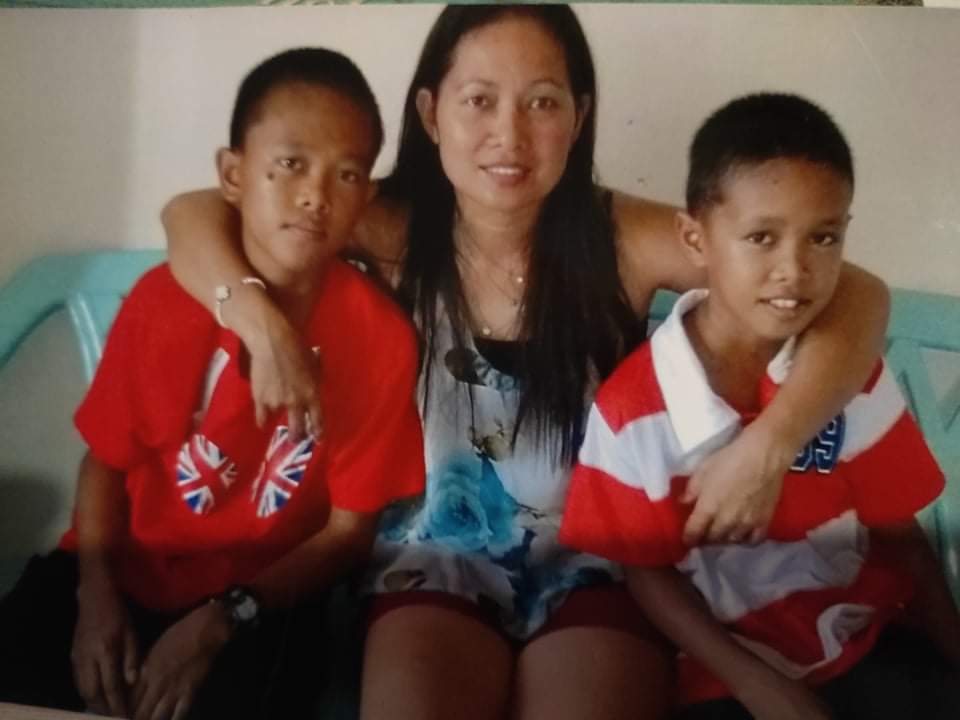
“Are they still alive?”
They felt a surge of frustration whenever she bumped into news about Tacloban. Everybody was talking about Tacloban. Almost all the photos and articles she found were about Tacloban. Although, they felt bad for the people of Tacloban, they were also hoping that somebody would at least talk about Guiuan. “What about Guiuan? Yolanda slammed Guiuan first!”
Sunday 11th November 2013
Images of the aftermath of the storm were splattered on every news website all over the world. Nora couldn´t believe how massive the destruction was. She couldn’t get over the fact that this was the typhoon she heard on the phone when it was crushing her house.
She carefully examined each photo. She checked the faces of the survivors. She checked the children, the old people. One of them could be her son. Or her mother, her father, or her sister. “Makikita ko pa kaya sila? Kakayanin ko kaya ito?” She felt helpless.
Nora couldn’t eat. Rumors of looting, hunger and slow relief operations worried her sick. She and Emmalyn decided to go to mass. They begged God to prepare them for the worst. The mass was offered to the victims of the typhoon and as the priest was asking the people to extend help to the victims, photos of the survivors were flashed on the projector. Nora and Emmalyn craned their necks to see each photo. Nora began to think of her two sons. What if they didn´t have food. Or they were sick. Or injured. After the mass, they were swarmed by their friends to offer support.
Monday, 12th November 2013
As the entire world had already known about what had happened in the Philippines, Nora read almost all the write-ups about the typhoon hoping to learn something about their hometown and eventually about their families. Her attention was caught by a photo of an aerial view of a town with a caption saying “Brgy. Hollywood, Guiuan.”
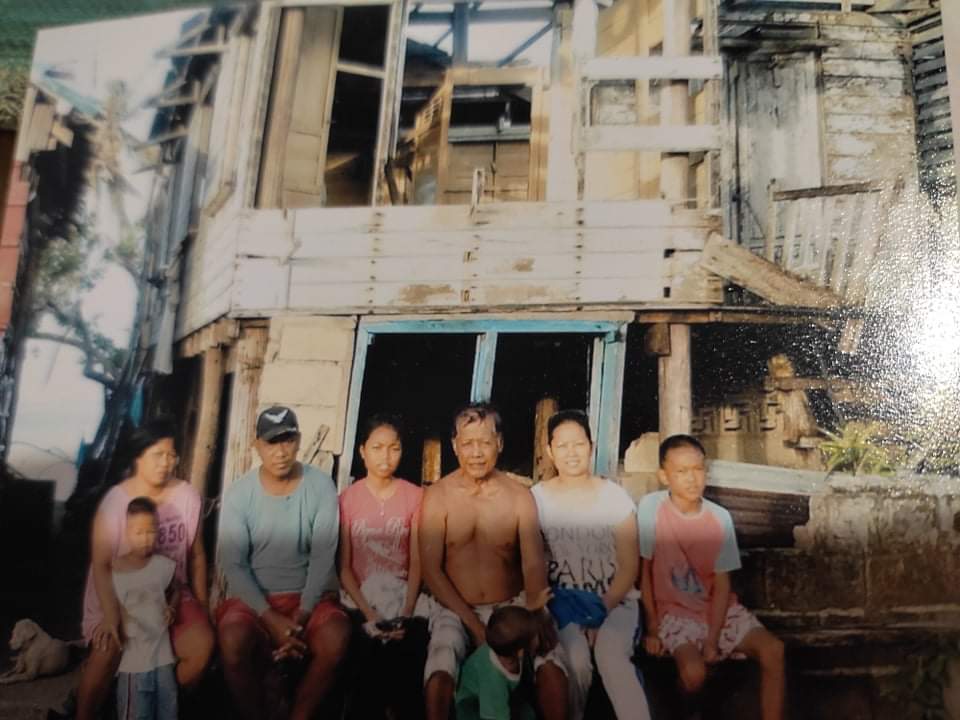
This was her family’s place. She zoomed in the image and she was sure she saw their house or rather, what was left of it. Their garden, all ravaged and destroyed. The roof and the balcony were gone. She imagined her son crying for help in the midst of strong winds, waves and rain. It was such a painful sight she found herself crying again.
A Catalan television channel offered to interview Nora and Emmalyn. This would be their chance to ask the world to help them look for their families. While waiting for their turn, they avoided the television screens flickering in front of them showing images filled with horror, fear and desolation: barefoot children wandering aimlessly, mothers holding their new-born babies, parents grieving over their lifeless children.
Tuesday, 13th November 2013
“Hindi ko ito tutulugan! Hindi ako titigil!”
Nora had a feeling that something would come up if she didn’t stop looking. At four in the morning, she came across an update posted by a friend’s friend on Facebook. The post said, “I hope my family in Guiuan is safe…” Her heart leapt at the mere sight of the word “Guiuan”.
She scrolled down hoping for a reply. Somebody replied. “For those who are from Guiuan, you can contact this person…” She knew the person. With her heart beating so fast, Nora dialed the number. It rang. Not until the third attempt did a calm voice pick up the call. Nora was hysterical. “Hello! Dexter! This is Nora!”
Dexter turned out to be in Cebu during the call. He was able to visit Guiuan right after the typhoon to check on his family. In yet another calm voice, he assured Nora that her mother was okay, her sons were okay, her sister and her family were okay. “Pero yung tatay mo, may sugat sa ulo.”
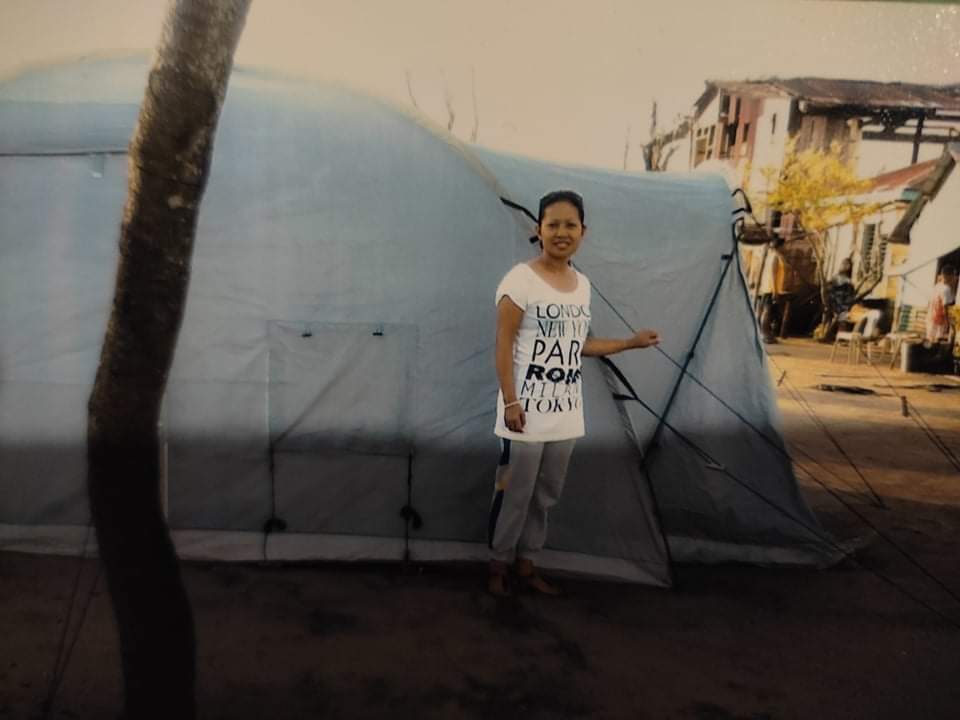
Emmalyn saw Nora dancing and shouting on the couch. “Buhay sila!” Nora then shoved the phone to Emmelyn. Emmelyn´s family was safe too. For several minutes, euphoria wrapped the whole house as the two celebrated the good news.They finally had the appetite to eat anything even if it would mean rice with only a glass of milk poured in it mixed with chocolate powder Neskwik.
Relieved and overjoyed, Nora thanked God and their friends for the unexpected turn of events. As if Dexter´s assurance wasn´t enough, Nora stumbled upon a video clip posted on Facebook of an interview of their town mayor. Finally, something about their town, she thought. She intently watched the video and suddenly, her heart froze and her nerves trembled. She paused the video, went back, paused one more time, played it back and paused again.
“Mga anak ko!!!”
In the clip, right after the mayor was interviewed, the reporter showed the extent of the damage in Guiuan. As the camera panned on the battered houses, it caught two boys passing by, with their backs to the camera, carrying a pail of water.
“Mga anak ko yan! Kilala ko ang lakad nila. Alam ko kung paano sila mag-igib. Kung paano inaalalayan ni bunso ang kanyang kuya!”
Nora started calling her siblings in Canada, Saudi Arabia and Manila. They needed to start planning what to do next.

The journey and the reunion
Two weeks after the devastating typhoon, the government stepped up its relief operations. Surviving families started to bury their dead relatives. International aides poured in. Nora, together with her Spanish employer and Emmalyn flew from Barcelona to Cebu and from Cebu, they rented a van to take them to Guiuan passing through Tacloban and Ormoc. Since the power line was still down, they couldn’t contact their families about their homecoming.
It took them almost three days to reach their destination. They stopped by Tacloban to fill their van with rice, water food, clothes and medicines.
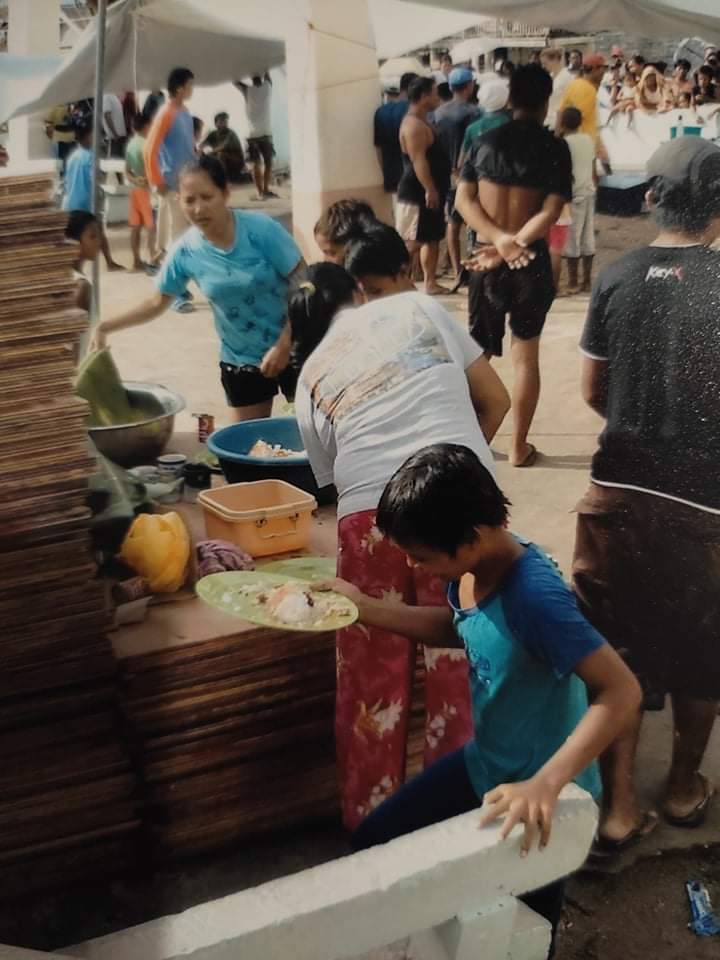
“I was a bit nervous during the whole trip. At night, it was very dark. The only light there was was coming from the headlights of our van. I can still remember the strong smell of dead bodies when we crossed the San Juan bridge. I saw dead bodies on the streets. In Ormoc, several children without clothes and slippers and several adults ran after our van asking for food. We had to stop to give them from our provisions. It was really sad and overwhelming.”
On 22nd November 2013, Nora arrived in Guiuan only to find out that her family had moved back to their other house in the neighbouring island of Suluan. She immediately boarded a pump boat and headed for Suluan. There was a huge number of people swarming the port waiting for international and national ships bearing relief goods. But her family was nowhere in sight. Finally, her family came running to the port to meet her. It was an emotional moment, she hugged each of them tightly, extremely grateful for having surviving the nightmare.
Eight years after Typhoon Yolanda
It has been eight years since Yolanda battered the Philippines. Nora’s children, now 20 and 19, still vividly remember what transpired that fateful night. Mill Anthony, the oldest son, shares how he and his family lived through the most devastating typhoons in history.
“On 7th November 2013, somebody from the town hall came to convince us to go to the evacuation center. But my grandparents, aunt and uncle decided to stay when we saw that the sun came out shining and it seemed that there would be no strong typhoon coming. The weather started to change during the night and at 3 am, we were awakened by strong winds and heavy rainfall smashing our roof. The roof gave in, then the balcony. We ran to look for cover but there was nothing left to protect us. We found ourselves soaking and lying on our belly trying to shield our heads with our hands. A falling tree hit my grandfather´s head and he was bleeding. I stayed calm. I didn’t panic.”
“We remained there for almost three hours. Then my aunt asked me to go to the neighbour’s house to ask for shelter. I braved the darkness and the strong gusty wind as I ran outside. Our neighbour´s house was partly damaged but there was still a place for cover so my family immediately moved in to the house. At 6 am, the weather calmed down, we took my grandpa to the hospital. On our way to the hospital, I saw flattened houses, uprooted trees lying on the ground. The hospital was full of wounded people. We moved to a friend’s house which was on an elevated place. It had survived the storm.“
“The next day, 9th of November was the birthday of my grandmother. Before the storm, we had planned to have a party so we bought a lot of food for the celebration. When we visited our house that day, everything was washed and blown away. The food and things we had bought for the party were gone. Even our mobile phones. I was worried about my mother. I knew she would be extremely preoccupied. Days passed and electricity was still down. We couldn’t connect online. We were crammed in the house of our friend, it was full of neighbours and strangers, making out whatever available space for shelter.”
“Every day, I was expecting that our mother would arrive and see us. Every time there were boats or ships docking on the port, my brother and I would run to see if our mother was on board.
My brother and I spent the days cleaning our damaged house and fetching water from the well to wash our clothes. Then my grandparents decided to move to Suluan to stay in our other house.”
“One day, a neighbour came running telling us to rush to the port. We ran as fast as we could. My mother had arrived! We hugged each other tightly! I knew she was coming.”
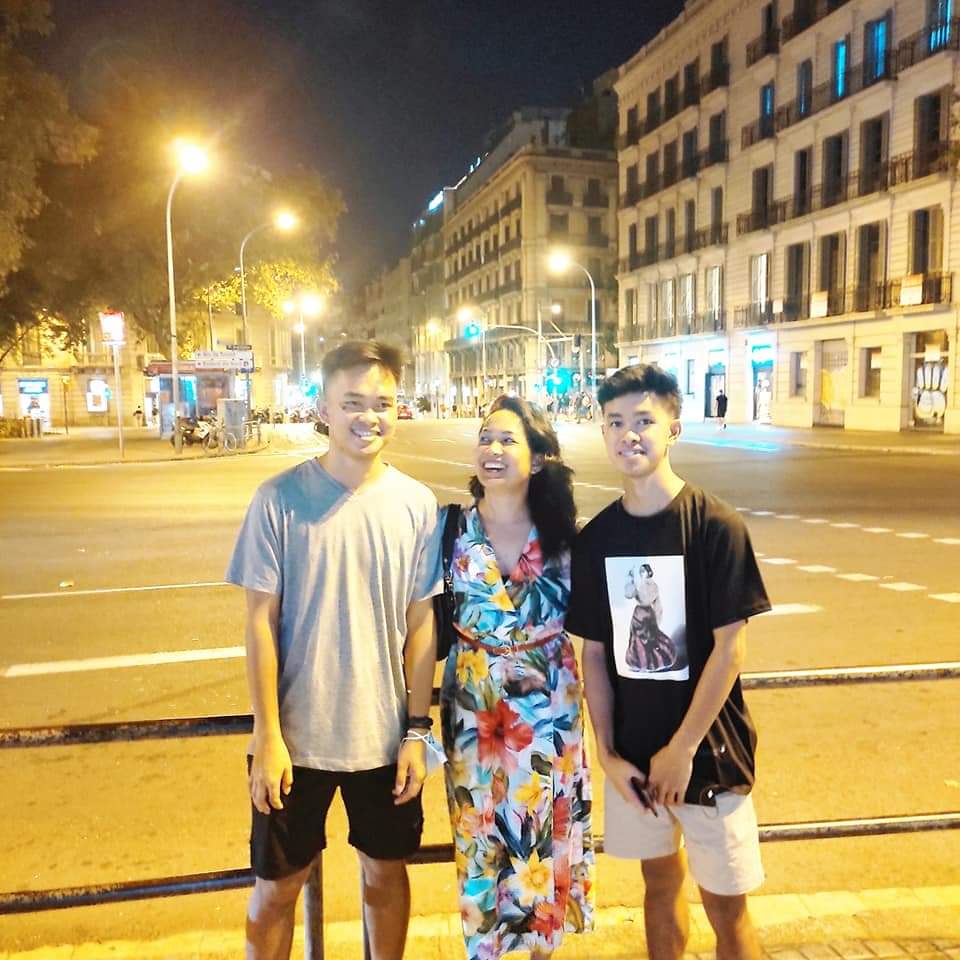
A mother’s faith, prayers and willpower
Nora stayed with her family for two more months before coming back to Barcelona. She wanted to help rebuild their community to get back on its feet. She volunteered to work as an interpreter every time there were international ships to distribute relief goods. In August 2017, her two sons arrived in Barcelona to finally join her.
Looking back, Nora hopes and prays never to be in the same harrowing situation again. She can’t imagine going through those long tortuous days of uncertainty and anguish. As a mother, it was the hardest time of her life but her prayers, faith and willpower held them together even if they were thousands of miles apart from each other.



